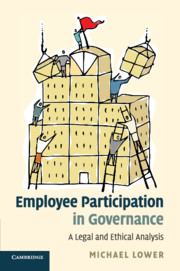Book contents
- Frontmatter
- Contents
- Acknowledgements
- Tables of legal instruments
- 1 Introduction
- 2 Catholic Social Thought: nature, sources and core principles and values
- 3 Catholic Social Thought and work
- 4 Catholic Social Thought, private property and markets
- 5 The corporation
- 6 The firm and society
- 7 Employee participation in corporate governance: an ethical analysis
- 8 Corporate Governance in the United Kingdom
- 9 Labour law and employee participation
- 10 Employee participation and EU corporate governance
- 11 Conclusion
- Bibliography
- Index
11 - Conclusion
Published online by Cambridge University Press: 05 October 2010
- Frontmatter
- Contents
- Acknowledgements
- Tables of legal instruments
- 1 Introduction
- 2 Catholic Social Thought: nature, sources and core principles and values
- 3 Catholic Social Thought and work
- 4 Catholic Social Thought, private property and markets
- 5 The corporation
- 6 The firm and society
- 7 Employee participation in corporate governance: an ethical analysis
- 8 Corporate Governance in the United Kingdom
- 9 Labour law and employee participation
- 10 Employee participation and EU corporate governance
- 11 Conclusion
- Bibliography
- Index
Summary
Integral self-realisation is the point of it all
CST is a branch of moral theology. It looks at social phenomena from the perspective of integral self-realisation, the all-round human development of each person. To apply CST's perspective to thinking about corporate governance is to ask about how corporate governance arrangements can promote human well-being. In the first place, it is to ask about what life in the corporation means for the moral well-being of its employees and shareholders.
Chapter one sought to explain the concept of integral self-realisation. Christian anthropology sees the human person as having an innate disposition to self-realisation. Reflection on one's own tendencies, and experience in general, suggest that there are certain goods that can be pursued (such as the preservation of life, the pursuit of knowledge, friendship, play, aesthetic experience and religion). It is a characteristic of the natural law theory that is built into CST that it seeks to identify the goods that are, as it were, the building blocks to be used in the construction of the good life. The point of moral theology is to set out principles to guide the individual quest for self-realisation (the more or less successful effort to become the person that one can and ought to be given one's own aptitudes, circumstances and so on). Moral theology focuses on the development of the individual, each and every individual. It considers how the most fundamental, most characteristically human elements of one's personality can be developed.
- Type
- Chapter
- Information
- Employee Participation in GovernanceA Legal and Ethical Analysis, pp. 190 - 201Publisher: Cambridge University PressPrint publication year: 2010

